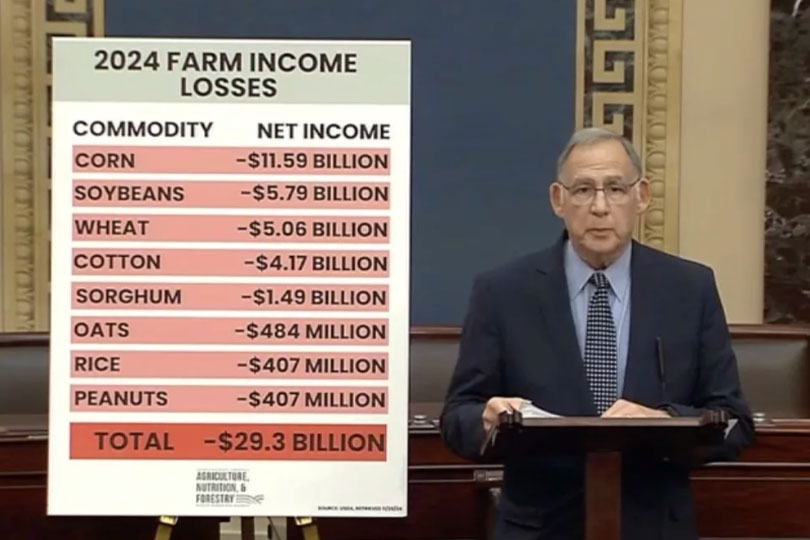By Jessica Domel
Multimedia Reporter
To ensure U.S. farmers can make it from this crop year to the next, U.S. Sen. John Boozman (R-Ark.), ranking member of the Senate Agriculture Committee, is urging Congress to approve significant economic assistance for farmers by the end of the year.
“We need to provide producers with the certainty and the predictability to be able to go to the bank and have confidence that help is on the way so they can continue farming,” Boozman said.
The ranking member pointed to increased input costs, higher interest rates and depressed commodity prices, combined with an outdated farm safety net, as reasons why conditions are dire right now in farm country.
“Farmers, lenders and community leaders in all regions of the country are saying the same thing. Farmers desperately need help. When you look at the numbers, it’s clear the pain our farm families are living through,” Boozman said. “At the end of November, row crop farmers nationwide are projected to lose more than $29 billion.”
Corn growers are forecast to lose more than $11 billion.
Soybean growers will lose $5.79 billion, Boozman said, and wheat farmers will lose over $5 billion.
“The numbers aren’t better for other commodities. Cotton, sorghum, rice and peanut producers are ending 2024 with projected average losses over $200 per acre,” Boozman said. “The reality behind these losses is even more worrisome for some producers.”
He noted this is the second or third year in a row some producers will have negative cashflow.
“This means many farm families are ending 2024 in the red, unable to pay off the year’s operating loan, unable to get a loan to farm in 2025 and face the reality of being the next generation to have lost the family farm due to extreme market conditions beyond their control,” Boozman said.
An Arkansas farmer told the ranking member he’s had the best crop yield of his career, but he’s still under water because commodity prices are so far below the cost of production.
“Even for producers who haven’t seen severe losses in 2024, the concern for 2025 continues to escalate as margins are forecast to remain poor,” Boozman said.
The farm income forecast, combined with the other factors, is taking a toll on farmers, their families and those involved in agribusinesses.
“In the last few months, there’s been a significant shift in the spirit of our farmers,” Boozman said. “After years of unprecedented challenges, they’re discouraged and pleading for stronger tools to help survive these conditions.”
The American Farm Bureau Federation, Texas Farm Bureau and other agricultural groups have been asking Congress to work on and pass a new, five-year farm bill with updated reference prices for farm safety net programs.
The groups are also asking Congress to consider economic assistance for farmers.
TFB leaders and members have met with Boozman and other members of Congress several times throughout the year discussing the current state of farm country and the need for a new farm bill and economic assistance.
“In recent meetings with members of the Texas Farm Bureau, Midwest Council of Agriculture, USA Rice and Arkansas Farm Bureau, who have been growing food and fiber for generations, they are worried about what the banker will say when they go to get credit for the 2025 crop year and what that means to their future in the industry,” Boozman said. “If Congress does not act appropriately, I worry many of these producers may not be around next year.”
The one-year extension of the 2018 Farm Bill expired at the end of September. Some farm bill programs expired at that time, but others, like the Agriculture Risk Coverage and Price Loss Coverage safety net programs, remain funded through the end of the year.
If Congress does not take action on a farm bill—either through an extension or passage of a new farm bill, the country could revert to permanent farm law from the 1930s and ’40s, worsening the economic conditions for farmers.
Senate and House Agriculture Committee members are reportedly working on another farm bill extension that includes economic assistance for farmers.
Congress is in session now through Dec. 20.


Leave A Comment